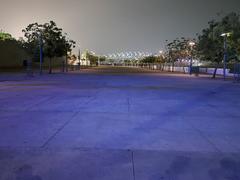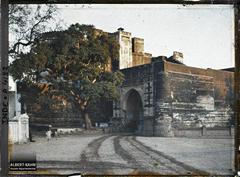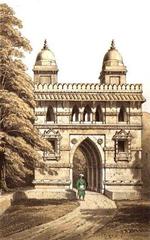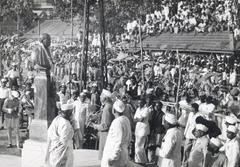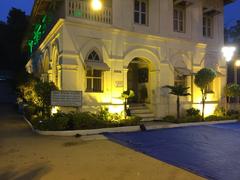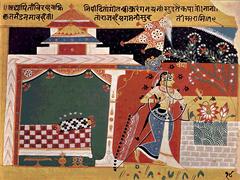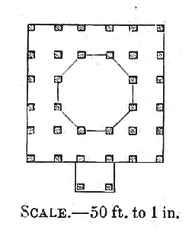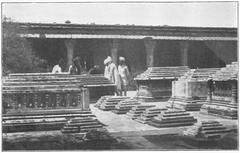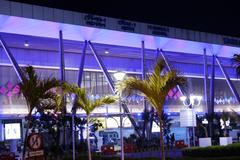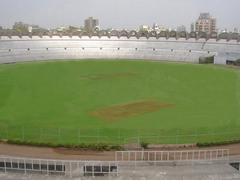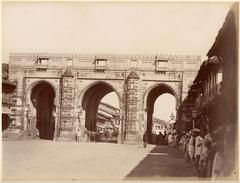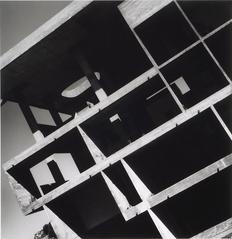Amritavarshini Vav, Ahmedabad: Visiting Hours, Tickets, History, and Essential Guide
Date: 15/06/2025
Introduction
Amritavarshini Vav, also known as Panchkuva Stepwell or Katkhuni Vav, is one of Ahmedabad’s hidden architectural marvels. Situated near Panchkuva Darwaja in the heart of the old city, this 18th-century stepwell is a testament to the ingenuity of traditional water management and the multicultural heritage of Gujarat. With its distinctive L-shaped design, understated Mughal arches, and rich historical context, Amritavarshini Vav offers a unique experience for history enthusiasts, architecture admirers, and travelers seeking to explore Ahmedabad’s lesser-known heritage sites. This guide compiles essential information on visiting hours, ticketing, accessibility, architectural highlights, nearby attractions, and travel tips to ensure a rewarding visit.
(aha.nascentinfo.com, yappe.in, wanderon.in)
Historical Background and Significance
Origins and Patronage
Built in 1723 CE by Raghunathdas, the diwan to Mughal governor Haidar Quli Khan, Amritavarshini Vav exemplifies the Mughal tradition of public waterworks as acts of philanthropy. Inscriptions in Persian and Devanagari commemorate its construction and underline the cosmopolitan spirit of Ahmedabad’s past. Its proximity to Panchkuva Darwaja—literally “Five Wells”—reflects its importance in the city’s water supply system and social life.
Architectural Distinctiveness
Unlike the more ornate stepwells such as Adalaj or Rani ki Vav, Amritavarshini Vav is celebrated for its functional elegance. The L-shaped plan, a rare feature among Indian stepwells, involves a right-angle turn after the initial descent, possibly influenced by urban constraints or hydrogeological factors. Descending over 50 feet below ground, the stepwell features three levels of stone steps, Mughal-style arches, and a small pavilion at the top. The minimal ornamentation emphasizes structural integrity while allowing for subtle geometric and floral decorations on pillars and arches.
(aha.nascentinfo.com)
Socio-Cultural Role
For centuries, stepwells like Amritavarshini Vav served not only as vital water sources but also as gathering spaces, particularly for women, and venues for spiritual reflection. The tradition of constructing stepwells as public endowments reflects both Hindu and Islamic influences and highlights Ahmedabad’s pluralistic society.
(wanderon.in)
Conservation and Modern Relevance
Amritavarshini Vav is a state-protected monument since 1969. Restoration efforts in the early 2000s, led by the Archaeological Survey of India (ASI) and local heritage groups, have stabilized and revived the structure, including clearing silt and recharging the water system. The stepwell is now integrated into Ahmedabad’s UNESCO World Heritage City narrative, reinforcing the importance of traditional water conservation in modern urban contexts.
(yappe.in, UNESCO Ahmedabad)
Visitor Information
Location and How to Reach
- Address: Panchkuva, Kalupur, Ahmedabad, Gujarat 380001
- Nearest Landmark: Panchkuva Darwaja, close to Kalupur Railway Station (approx. 2 km), and 10 km from Sardar Vallabhbhai Patel International Airport.
- Transport: Easily accessible via auto-rickshaw, taxi, city bus, or by foot from nearby landmarks. (Gujarat Tourism)
Visiting Hours & Tickets
- Open: Daily, 9:00 AM – 6:00 PM
- Entry Fee: Free for all visitors; no tickets or permits required. (ASI Ahmedabad Circle)
Accessibility
- The stepwell is not wheelchair accessible due to steep and uneven stone steps.
- Elderly visitors and those with mobility challenges should exercise caution, especially during monsoon season.
What to See
- L-shaped Descent: Experience the rare right-angled turn after the initial flight of steps.
- Mughal-Style Arches: Observe varied arch designs across levels, blending Mughal and Gujarati styles.
- Three-Storey Pavilion: The uppermost level features a simple pavilion with arched openings.
- Historic Inscriptions: Bilingual inscriptions in Persian and Devanagari detail the stepwell’s history and patronage.
- Restoration Details: Note areas where recent conservation has stabilized masonry and improved visitor safety.
- Cool Subterranean Ambiance: The stepwell’s depth offers a tranquil, cool refuge from the city’s heat.
Nearby Attractions
- Sidi Saiyyed Mosque: Famous for intricate jali (stone lattice) work; 1.5 km away.
- Manek Chowk: Lively market and street food destination; 2 km.
- Jama Masjid: Majestic mosque from the 15th century; 2.5 km.
- Bhadra Fort: Historic fort complex; nearby.
- Calico Museum of Textiles: Renowned textile collection; 4 km.
- Historic Pols and Havelis: Traditional residential clusters and mansions within walking distance.
Practical Tips for Visitors
- Footwear: Wear comfortable, non-slip shoes.
- Best Time to Visit: Early morning or late afternoon for cooler temperatures and better photography light.
- Photography: Allowed for personal use; professional equipment requires ASI permission.
- Facilities: No restrooms or refreshment stalls onsite; nearest facilities at Kalupur Railway Station (500 meters).
- Duration: Plan for 30–45 minutes at the site.
- Safety: Supervise children and avoid venturing beyond designated areas.
- Cultural Etiquette: Dress modestly, avoid littering, and respect the sanctity of the monument.
Guided Tours & Digital Resources
- Heritage walks led by local groups often include Amritavarshini Vav; book in advance for a richer experience.
- Educational virtual tours and 360-degree digital exhibitions are available through platforms like the Living Waters Museum.
- QR codes and audio guides are increasingly available on-site or via local heritage apps.
Conservation and Community Involvement
Preservation of Amritavarshini Vav is a collaborative effort involving the State Archaeological Department, academic institutions, and civil society. Community engagement, awareness programs, and visitor feedback are vital for ongoing maintenance and protection of this important heritage site.
(ASI Ahmedabad Circle, UNESCO Ahmedabad)
Frequently Asked Questions (FAQ)
Q: What are the visiting hours of Amritavarshini Vav?
A: Open daily from 9:00 AM to 6:00 PM.
Q: Is there an entry fee?
A: No, entry is free for all visitors.
Q: Is the site wheelchair accessible?
A: No, due to steep steps and uneven surfaces.
Q: Are guided tours available?
A: Local heritage groups offer walks that include the stepwell; digital tours are also available.
Q: Are photography and videography allowed?
A: Yes, for personal use. Professional shoots require permission.
Q: Are there restrooms or refreshments on site?
A: No; nearest facilities are at Kalupur Railway Station.
Visual and Interactive Resources
- Explore virtual tours and interactive maps via Living Waters Museum.
- Search for images with alt text such as “Amritavarshini Vav historic stepwell in Ahmedabad” for online galleries and resources.
Final Tips and Conclusion
Amritavarshini Vav stands as a living testament to Ahmedabad’s spirit of innovation, communal harmony, and architectural prowess. Its L-shaped descent, Mughal-Gujarati arches, and bilingual inscriptions provide a window into the city’s layered history. Free and centrally located, the stepwell is ideal for a heritage-focused itinerary. Combine your visit with nearby sites, use digital resources for deeper insights, and support responsible tourism by respecting the monument’s legacy.
Plan your visit today and immerse yourself in the stories etched into every stone of Amritavarshini Vav—a true jewel in Ahmedabad’s historical crown.
References and Further Reading
- Amritavarshini Vav on aha.nascentinfo.com
- Visitor Info on yappe.in
- Stepwells in Ahmedabad on wanderon.in
- Ahmedabad Tourism Official Site
- Archaeological Survey of India Ahmedabad Circle
- Ahmedabad Municipal Corporation
- UNESCO Ahmedabad World Heritage City Listing
- Living Waters Museum: Steps to Hope

